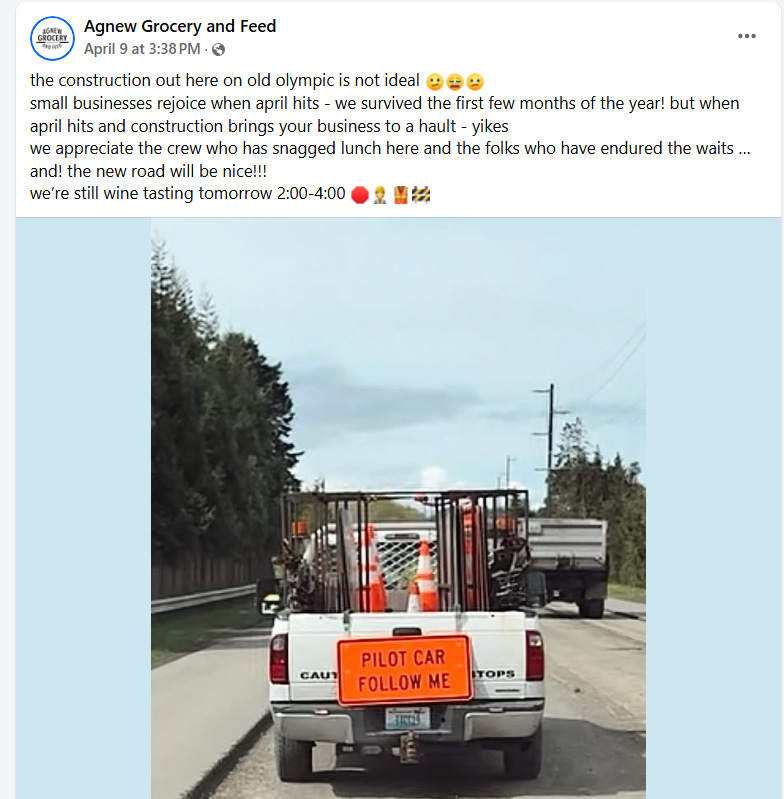Billions spent, businesses crushed, highways ripped apart — and the salmon still can't get through. Olympic Peninsula residents are paying the price for a broken system where "disadvantaged" millionaires cash in, and taxpayers are left with gridlock, empty promises, and skyrocketing costs.
Locals are quickly learning they need to factor in significant delays when traveling around the Olympic Peninsula this summer. The City of Port Angeles is resurfacing 8th Street, while US Highway 101 is closed at Tumwater Creek, forcing drivers onto residential streets and the Tumwater Truck Route. Quiet neighborhoods have been turned into noisy, congested thoroughfares, and local businesses are struggling as customer traffic dries up.
Agnew Grocery, which recently weathered the repaving of Old Olympic Highway, tried to adapt while traffic passing their business all but disappeared. Their survival was largely thanks to work crews who patronized the store.
Lakeside Industries handled much of the construction work in Agnew. However, some subcontracting—specifically, pipe installation and catch basin construction—was awarded to a "Disadvantaged Business Enterprise" (DBE). In this case, the contract went to the Jamestown S’Klallam Tribe. While DBE programs are intended to support truly disadvantaged businesses, the Jamestown Tribe, whose 509 enrolled members reported over $85 million in revenue last year, somehow still qualifies for federal "disadvantaged" status.
A widening money pit
But none of this local chaos compares to the astronomical cost and sheer disruption caused by the state's culvert replacement projects—projects that have already choked traffic for years and will continue to do so for many more.
And here's the part they don’t like to talk about: these culvert replacements weren't the result of careful planning or public demand. They were the result of a lawsuit — filed by tribes including the Jamestown S’Klallam — suing the people of Washington State to force an estimated $4 billion in culvert replacements, regardless of feasibility, cost, or common sense. Updated cost estimates have doubled to $7.8 billion.
Instead of negotiating sensible solutions or recognizing the crushing burden on working-class taxpayers, the Jamestown Tribe and others pushed the issue through the courts. They won — and the court forced the state to rip up functioning highways, destroy small businesses, and drain the public treasury in the name of "restoring salmon passage" — even when, as we're seeing firsthand, the fish still can't get through.
Cutoff culverts
Highway 101 travelers between Port Angeles and Sequim are now factoring in major delays as new culvert projects begin at Lees and Ennis Creeks. Those heading west past Forks can lose track of how many one-lane sections and culvert replacements they encounter.
The latest: two salmon barrier removals east of the Jamestown Tribe’s gas station in Blyn, part of a six-bridge, $107 million project that has left drivers frustrated and taxpayers footing an ever-growing bill.
Local timber faller Mitch Zenobi, who usually shares glimpses into the timber industry with his 43,000 Facebook followers, recently took viewers on a video tour of two sites.
What he found was telling: downstream of the newly-installed, multi-million-dollar bridges is... another culvert—this time under the old Milwaukee Railroad grade, now the Olympic Discovery Trail.
"Tell me why the culverts upstream of two or three other culverts was the one that was important," Zenobi asked. In other words: how is it "restoring salmon passage" to replace a highway culvert, when salmon are still blocked by old, unimproved culverts just yards downstream?

And it gets worse: for a salmon to even reach the Olympic Discovery Trail culvert, it would first have to leap four feet vertically just to enter another series of outdated culverts under East Sequim Bay Road and Old Blyn Highway. So much for seamless salmon migration.
Hypocrisy on display
Over a year ago, during one of the last truly open town halls hosted by the People's Forum, citizens had a rare opportunity to ask questions of their elected officials. Commissioner Mark Ozias declined to attend. Commissioner Mike French, however, defended the extravagant culvert replacement costs, saying:
"This is a generational investment in a lot of bridges, that are going to need that investment at some point anyway."
Translation: it's fine to spend billions of taxpayer dollars now—to tear apart functioning highways—because we might have to tear them apart someday.
This circular logic sums up the entire approach: burden today's taxpayers with astronomical costs to fix theoretical future problems, even when the "fixes" are incomplete and illogical. Meanwhile, traffic suffers, businesses wither, and the salmon are still blocked.









It is a tragedy that fish biologists, perhaps ichthyologists, were not involved from the beginning. Anadromous fish require year round water flow. I have no clue how many of these projects involve seasonal only run-offs, but from a Salmon restoration perspective they are useless. Anadromous fish runs are amazingly adaptable survivors, but without water they cannot exist. Ironic that this waste of resources manifested from people claiming aboriginal ancestry filing law suits. From the human evolution chart starting with "0" humans to our now eight billion humans where is the genealogical line that divides aboriginal from non-aboriginal ? Once that is known, ponder how many of those humans live today. The absurdity of different rights and privileges for differing ancestries is not compatible with equality.
It is so hard to measure the abundance of idiotic money grabbing waste of taxpayer dollars against each other due just to the sheer number alone, but this scam is perhaps the biggest boondoggle since the last administration.
Nothing related to this thievery of hard earned taxpayer money has as little return on investment at the state level. You have to be the former bloated national bureaucracy to equate to this rampant highway robbery.
The fact that Commissioner Mike French supports this criminal activity says it all. To slog our collective way out of this we have to get behind a courageous and tenacious leader with broad support and a laser focused on truth, facts, and transparency. I believe one is arising out of Clallam County government today.